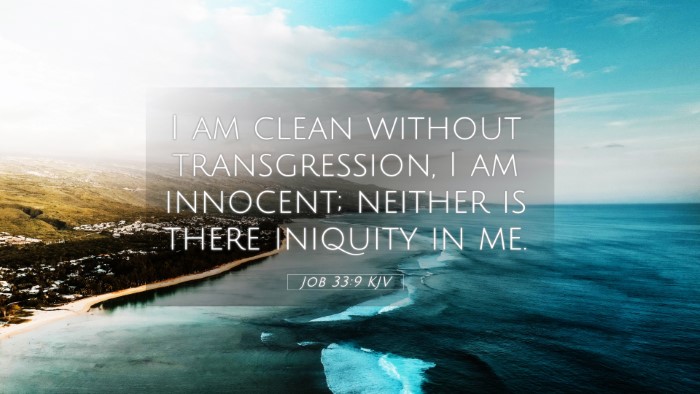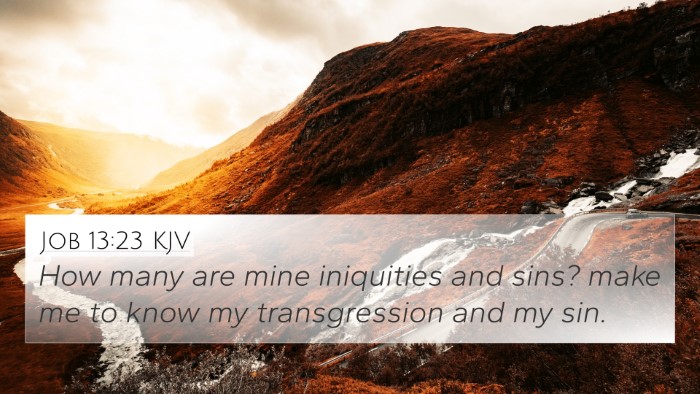Understanding Job 33:9
Job 33:9 states: "I am clean without transgression, I am innocent; neither is there iniquity in me." This verse comes from the dialogue between Job and his companions, specifically focusing on Job's defense of his innocence amidst his suffering. The interpretations offered by traditional commentaries provide insight into the theological implications of this assertion, as well as its connections to other scriptures.
Summary of Insights from Commentaries
Job asserts his innocence with a fervent conviction, stating that he possesses no guilt or sin that merits the suffering he endures. This verse, according to various commentaries, is significant for several reasons:
-
Affirmation of Innocence:
Matthew Henry emphasizes that Job's proclamation reflects his desire to defend himself against the accusations of his friends, who misinterpret his sufferings as a direct result of personal sin.
-
The Nature of Suffering:
Albert Barnes discusses the broader theme within the Book of Job regarding the nature of righteous suffering, suggesting that Job's distress does not originate from moral failure.
-
Reflection of Human Integrity:
Adam Clarke highlights the importance of integrity in Job's character, suggesting that despite external pressures, one may still stand in righteousness before God.
Connections Between Bible Verses
In exploring Job 33:9, it can be beneficial to link this verse to others that discuss similar themes of innocence, suffering, and divine justice. Below are several related Bible verses:
- Psalm 15:2: "He who walks blamelessly and does what is right and speaks truth in his heart." - This verse aligns with the theme of righteousness.
- Proverbs 4:18: "But the path of the righteous is like the light of dawn, which shines brighter and brighter until full day." - Highlights the trajectory of a righteous life.
- Luke 1:6: "And they were both righteous before God, walking blamelessly in all the commandments and statutes of the Lord." - Connects to the theme of being upright before God.
- Romans 8:1: "There is therefore now no condemnation for those who are in Christ Jesus." - This showcases the doctrine of grace despite one’s past.
- 1 Peter 3:14: "But even if you should suffer for righteousness' sake, you will be blessed." - Addresses unjust suffering in line with righteousness.
- Hebrews 11:4: "By faith Abel offered to God a more acceptable sacrifice than Cain, through which he was commended as righteous." - Reflects the concept of being recognized as righteous.
- Job 1:1: "There was a man in the land of Uz whose name was Job, and that man was blameless and upright, one who feared God and turned away from evil." - Illustrates Job’s character at the beginning of the narrative.
Thematic Bible Verse Connections
Job 33:9 can also be seen as part of a larger narrative concerning the struggle between human integrity and perceived divine justice. The following points summarize key thematic connections:
-
The Mystery of Suffering:
The dialogues in Job reveal that suffering is not always a punishment for sin, a theme echoed throughout the Gospels, where Jesus addresses suffering and righteousness.
-
Faith Amidst Trials:
This verse represents a broader thematic connection to faith in times of adversity, encouraging believers to hold onto integrity regardless of circumstances.
-
Divine Justice:
Similar to the messages found in the prophets, this verse underlines the complexity of divine justice, suggesting that human understanding of righteousness may differ from God’s divine perspective.
Cross-Referencing Biblical Texts
Employing tools for cross-referencing biblical texts can enhance the understanding of Job 33:9. Here’s how to utilize a Bible cross-reference system:
-
Using a Bible Concordance:
A concordance can help identify words like "innocent" and "righteous," linking to corresponding scriptures across both the Old and New Testaments.
-
Online Resources:
Many online platforms offer Bible reference resources that can provide quick cross-references to similar themes and verses.
-
Study Groups:
Engaging in cross-reference Bible study with peers can lead to deeper insight into how verses relate and support one another.
Conclusion
Job 33:9 stands as a powerful declaration of innocence, rooted in a plea for understanding. This verse opens a window into the complexities of suffering, integrity, and the nature of divine justice. By examining Job's assertion alongside related scriptures, we can appreciate the nuanced discussions of righteousness within the Bible. Cross-referencing these moments can enrich understanding, offering tools for deeper study and meaningful application in life.
















